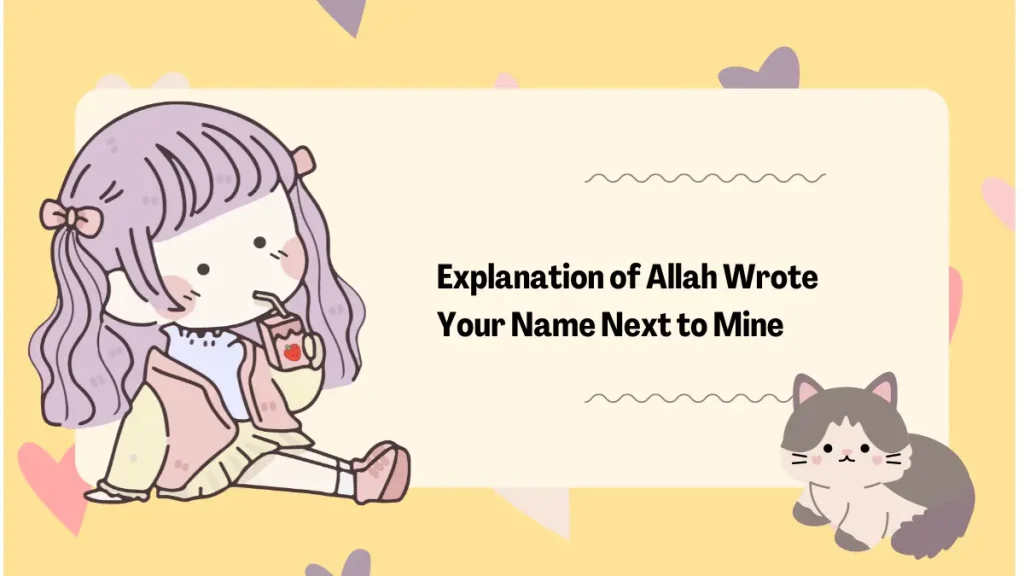In the tapestry of life, some moments seem intricately woven by a higher power, moments where we feel the gentle guidance of a force beyond our comprehension. “Allah wrote your name next to mine” is a phrase that encapsulates the essence of these profound connections, where destiny intertwines two souls in a bond ordained by the Divine.
The Concept of Qadr
In the Islamic tradition, the belief in qadr, or divine destiny, holds significant importance. It teaches us that every occurrence, every encounter, is meticulously planned by Allah. Thus, when we utter the words, “Allah wrote your name next to mine,” we acknowledge the hand of the Divine orchestrating the events of our lives.
Explanation of Allah Wrote Your Name Next to Mine
It is usually said to the marriage partner that Allah Wrote Your Name Next to Mine. This means that Allah has written your name for me, so I will marry you, no matter how many obstacles or objections come, it will not be disturbed.
Because everything that happens in people’s lives including marriage, sustenance is written in Taqdeer. Allah Ta’ala wrote about the power of all creatures fifty thousand years before the creation of the heavens and the earth (Sahih Muslim, /2653).
Then Taqdeer is written again in the mother’s womb at the age of four months (Sahih Muslim, Ha/2643).
But it is reprehensible to sit and rely on that destiny, instead we are called to act. Because we do not know Taqdeer before it is revealed.
The Prophet, may God bless him and grant him peace, said:
‘Keep on doing deeds, for the deeds for which they were created will be made easy for them. For the person who will be fortunate, the actions of the fortunate will be made easy. And for the unfortunate one, the deeds of the unfortunate people will be made easy for him’ (Sahih Bukhari, Ha/4949). So we have to work instead of relying on destiny.
Acknowledging Divine Connections: Gratitude for Spiritual Bonds
This phrase resonates with a profound sense of spiritual connectedness, reminding us that our paths are not merely a product of chance, but rather a part of a grand design. It speaks to the belief that every person we encounter, every relationship we forge, is a manifestation of Allah’s divine plan.
Love and Companionship in Islam: The Power of Divine Affection
Moreover, this phrase serves as a reminder of the power of love and companionship in Islam. The Prophet Muhammad (peace be upon him) said, “When Allah loves a servant, He calls Gabriel and says: ‘I love so-and-so; so love him.’ Then Gabriel loves him.
After that, Gabriel makes an announcement among the inhabitants of the heavens: ‘Allah loves so-and-so; so love him.’ Then the inhabitants of the heavens love him. He is then granted the pleasure of the people on the earth” (Sahih al-Bukhari).
Finding Comfort in Divine Wisdom: Trusting in Allah’s Plan
In this light, Allah wrote your name next to mine becomes a testament to the profound love and mercy of Allah. It signifies that our connections with others are not solely based on human desires or whims but are ordained by a higher power who knows what is best for us.
Conclusion
In conclusion, Allah wrote your name next to mine is more than just a phrase; it is a profound acknowledgment of the divine connections that shape our lives.
It encapsulates the essence of qadr, highlighting the belief that every person we meet and every relationship we form is part of Allah’s divine plan. By embracing this concept, we can find meaning, purpose, and comfort in the intricate tapestry of our lives, knowing that Allah’s hand guides us every step of the way.







